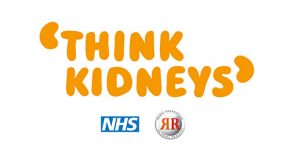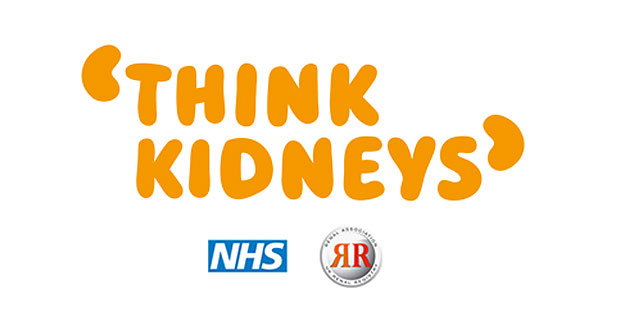Working with Care Homes to Improve Awareness of Acute Kidney Injury
 Think Kidneys is the NHS campaign to improve the care of people with, or at risk of acute kidney injury (AKI). Acute kidney injury (AKI) is the sudden loss of kidney function over a period of hours or days and can occur often without symptoms. It is a global health care challenge; it is common, causes harm and suffering, and in many instances, it can be prevented. It is detected though a routine blood test.
Think Kidneys is the NHS campaign to improve the care of people with, or at risk of acute kidney injury (AKI). Acute kidney injury (AKI) is the sudden loss of kidney function over a period of hours or days and can occur often without symptoms. It is a global health care challenge; it is common, causes harm and suffering, and in many instances, it can be prevented. It is detected though a routine blood test.
Of over 500,000 cases of AKI every year in England, approximately 65% of starts in the community. AKI is a contributing factor in the deaths of around 100,000 people each year in the UK. Older people are at increased risk, linked to a range of complex health conditions, including heart failure, diabetes, chronic kidney disease and dementia. The 400,000 people who live in care homes remain a very high risk group for AKI. They may not be able to take enough fluids due to physical frailty or may lose the ability to recognise they are thirsty due to dementia. Combined with underlying chronic medical issues, dehydration may precipitate AKI in this vulnerable group.
Think Kidneys has developed resources and guidance for each sector of the NHS over the last three years. However, when it came to thinking about the community, care homes were identified as a priority. But the NHS doesn’t work often with the care home sector and as we wanted to get this right, and produce materials that were easy to access and use for care home staff, and that would help raise awareness and improve the prevention, detection, management and treatment of the condition. We decided the best way to do this was to ask them.
We invited a cross section of people to a launch event – health care assistants, nurses, managers, commissioners, improvement experts and academics, nutrition and hydration specialists, so that we could discuss and learn what was needed and in what form. From the hundred people who attended, volunteers formed a working group and developed the resources. They were piloted by 45 care homes, tested and refined, and are now available for anyone to access at www.thinkkidneys.nhs.uk/aki/resources/carehomes
Recognising the challenges experienced in care homes such as high staff turnover, recruitment problems and difficulties in releasing staff to undergo training we knew that the resources had to be concise, effective and quick, providing appropriate training, some simple-to-follow tips, and signposting for more help.
Paula Cashmore, Clinical Quality Monitoring Officer from NHS Birmingham Crosscity CCG, was a member of the project group. She said:
“As a former nurse from a nursing home and a member of the in-house quality team at Birmingham Crosscity CCG, I was keen to be involved in the Think Kidneys initiative. We have good links to nursing homes in our region and see the problems associated with dehydration and Acute Kidney Injury. It is essential for care homes to be aware of the importance of keeping residents properly hydrated. Dehydration carries with it the associated risks of confusion, UTIs, falls, and multiple organ failure as well as AKI. The CCG is responsible for carrying out quality audits at nursing homes in our region and we have now included a number of recommendations aimed at helping nursing homes to prevent, diagnose and manage AKI more effectively.”
One of the care homes in Birmingham involved in the pilot was Boldmere Court. Operations Director, Kerry Jackson said:
“Our staff received training from the Think Kidneys team in July 2016. As a result we introduced a range of improvements. We now have dedicated drinks champions whose role it is to encourage residents to drink at least two litres of fluid a day. We have also introduced jellies, ice cream and yoghurts, which provide an alternative way of increasing the fluid intake for residents. We encourage our residents to make their own jellies and ice creams alongside the drinks champion and our activities officer. Families, too, have been told about the benefits for residents of these foodstuffs and have begun to bring these in as an alternative to chocolates or other treats. We have stickers on each resident’s door showing what they like and don’t like in terms of fluids so that agency staff are aware. We now use the education resource pack to deliver our own in-house training to staff.”
Since the training from Think Kidneys, Boldmere Court has seen the number of urinary tract infections on the dementia unit fall from 10 to one over a period of eight weeks. There were zero hospital admissions for AKI in that time.
Paula Cashmore from the CCG commented:
“Each of the nursing homes that has been involved in this initiative has fed back to us the huge difference it has made to residents. There is a far greater awareness of the importance of hydration in these homes. The impact has been significant. Nursing homes report less confusion amongst residents and far fewer incidents of UTIs. This is likely to lead to fewer falls and less AKI.
“Residents in nursing homes have a high level of dependency. They rely on staff for many of their care needs and it is the responsibility of everyone in the nursing home to do whatever they can to keep residents well hydrated. This is an important initiative and we will be encouraging all nursing homes in our area to deliver the Think Kidneys training to their staff.”
Richard Fluck, Chair of the Think Kidneys programme and consultant renal physician, said of the care homes work
“We have been delighted with the work taking place in care homes – the staff and teams have been inspirational in developing the ideas from Think Kidneys for the needs of their clients and staff. We know the simple resources developed can have a significant impact. This isn’t just about stopping people from having to be admitted to hospital – it’s about taking simple steps to prevent suffering, pain and hardship for some of the most vulnerable and frail people in our society. NHS Birmingham Crosscity CCG have shown the way forward for improving care in this important and expanding area. Carers in care homes can make a very big difference in reducing the burden of this life-threatening condition.”
For more information about the Think Kidneys programme and work with the care homes, visit www.thinkkidneys.nhs.uk/aki/resources/carehomes






